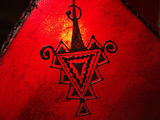Intel Brief: A Step for Morocco's Amazigh
By Nicolas D Gutowski for ISN
By allotting valuable mass media space to an endangered language, the Moroccan government is contributing to continuing efforts to save the Amazigh culture from extinction.
The road leading to the creation of Tamazight was not an easy one. In 2006, the Royal Institute of Amazigh Culture (IRCAM), created by King Mohammed VI, announced that it would fund a television station in the Amazigh language (also called Tamazight), but financial difficulties forced the organization, led by Ahmed Boukous, to abandon its plans.
Despite this, extensive advocacy by Boukous and IRCAM led to the announcement in 2008 that the Moroccan government would fund the channel. Those in charge of administering the station’s launch external pagerepeatedly postponed its unveilingcall_made, even as recently as 4 January 2010. The frequent postponements led many to external pageexpress opinionscall_made regarding the government’s lack of political will with regard to the creation of an Amazigh television station.
Officially going on the air on 13 January, Tamazight will broadcast programs ranging from political commentaries to shows aimed at younger audiences for six hours on weekdays and 10 hours on weekends. The station will external pagemaintain a budgetcall_made of 60 million dirhams ($7 million). The station administrators plan to air Amazigh-language programming with Arabic subtitles to encourage non-Amazigh people of Morocco to watch as well.
Still relatively new and becoming increasingly popular in Morocco, many regard television as a primary form of cultural expression. Members of the Amazigh community viewed their lack of a television station as a serious oversight on the part of the government in providing cultural representation to its people. Boukous, external pageas quoted by Agence France Pressecall_made, stated that “we [the Amazigh community and IRCAM] are relying a lot on television” to revitalize Amazigh culture and language.
Members of the Amazigh community herald the station as a great victory. Moroccan Communications Minister Khalid Naciri said that “Tamazight will bring a huge added value” and “will play an important part in promoting Amazigh culture.” Many see Tamazight as the definitive manifestation of the promise made by external pageKing Mohammed VI in a speech in Ajdircall_made in 2001 that acknowledged the Amazigh people as an integral part of Moroccan society.
Despite the warm reception from many in the Amazigh community, others feel that Tamazight is an insufficient effort to establish a legitimizing presence for the Amazigh people. A Moroccan economics external pagestudent quoted by Maghrebiacall_made lamented the weakness of Tamazight’s pilot schedule, and stated that it failed to appeal to the diverse community of Amazighs in and around Morocco.
Amazigh culture in history
Estimated by some to comprise roughly 30 percent of Morocco’s population, Amazigh culture has long been a difficult subject to address in the country. Caught between the pressures of an Arab identity and French colonial influence, the Amazigh people feel themselves victims of political circumstance, shoved aside in an effort to create a single, cohesive Arab society.
The Amazigh culture encountered particular difficulties up to the early 1990s, as external pagepolicies of 'Arabization'call_made by the Moroccan government attempted to create a singular Arab identity for the Moroccan people. An example of this came on 23 February 2009, when Moroccan authorities external pagedistributed lists of banned namescall_made to Moroccan embassies in the Netherlands, citing them as 'un-Islamic.' Many of the names were Amazigh in origin. Moroccans abroad cannot legally renounce their Moroccan citizenship without a royal decree and thus remain under the purview of the king.
The Moroccan government also until recently banned the teaching of the Amazigh language in schools, encouraging instead Arabic and French. It was not until 1994 that former king of Morocco Hassan II promised to create a fairer system that would preserve the culture of the Amazigh people. Though the government initiated some reforms, such as the introduction of Tamazight lessons in schools, many felt the struggle to keep up with the day-to-day pull of modernization made it difficult to external pagepreserve their Amazigh heritagecall_made.
Upon succeeding his father, King Mohammed VI sought to distance himself from the dubious human rights record of Hassan II by pushing aggressively for reforms. One of the areas given early attention was the issue of the Amazigh people, with the creation of IRCAM in 2001. Members of the Amazigh community treasure the reforms, though they stress the damage already done by past policies.
In its Atlas of the World’s Languages in Danger, UNESCO external pageranks the Tamazight languagecall_made as “definitely endangered,” which it defines as a situation in which “children no longer learn the language as mother tongue in the home.”
The effects of past policies have penetrated deeply into the culture of the Amazigh people, yet the creation of a television station emphasizing its language is an important step forward. As technological advances in the arena of entertainment continue, such reforms are likely to have more and more of an impact on the people of Morocco.

